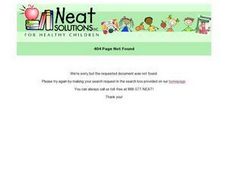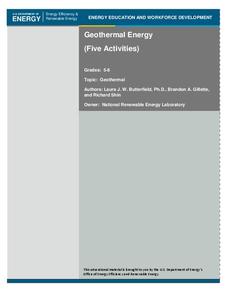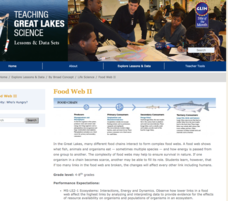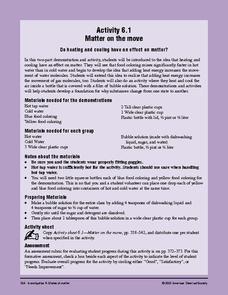Curated OER
Food Webs
Sixth graders discuss and describe consumers and producers. They discuss and describe predator-prey relationship. Students review food chains. They form a circle, and each student is given an ecosystem card. Student at the top is given...
Curated OER
Going Bananas!©
Young scholars discuss importance of eating five servings of fruits and vegetables for a healthy lifestyle, and identify bananas as an excellent source of energy.
Curated OER
Food Preservation: Food Science, Canning, Gardening
Learners consider the procedures and safety issues involved in food preservation. They conduct experiments in canning, freezing and drying. If everyone can preserve food utilizing a variety of methods and science principles, the lesson...
Curated OER
Tropical Forest Food Chain
Learners explore the interdependence of the animals and plants in tropical rainforests. They explore the importance of conserving biodiversity and tropical food chains. They create a tropical forest food chain and identify species that...
Curated OER
5 Step Food Chain Lesson
Have your class discuss food chains using this resource. Learners watch a presentation on the food chain and how we are dependent on the smallest life forms. They write newspaper articles and create an illustration describing the food...
Curated OER
Construction of Food Chains and Tracing Energy Changes
If you need a few basic activities for teaching food chains to your emerging ecologists, here they are. Three sheets of organism cards are included for learners to cut out and arrange according to trophic relationships. To make the most...
Science Matters
Energy Flow
Budding scientists work collaboratively to reenact energy flow in a food chain. Scholars take on roles such as producer and consumer and perform tasks that symbolize energy flow in order to provide evidence of how much energy passes...
Serendip
Food Webs, Energy Flow, Carbon Cycle, and Trophic Pyramids
The reintroduction of a species to an area doesn't always go as expected. Scholars learn about the reintroduction of wolves into Yellowstone National Park with a video, reading, and discussion questions. They complete a hands-on activity...
Texas Heart Institute
Nutrition: How Do I Choose the Right Foods?
Young learners discuss how to practice healthy eating habits and the body's need for energy through discussion and exploration of the MyPlate system.
University of Georgia
The Power of Peanuts
Measure the amount of energy in a peanut by igniting a chemical reaction. Classes use a laboratory setup to burn a peanut and measure the amount of heat it releases through a temperature analysis. They calculate the number of Joules of...
Teach Engineering
Photosynthesis—Life's Primary Energy Source
Wouldn't it be great if you could produce your own food? Scholars learn about the processes of photosynthesis and cellular respiration in plants. They consider how to use photosynthesis as a model of an efficient system and how to apply...
Channel Islands Film
Human Impact on the Food Web of Santa Cruz Island
What happens when a non-native species is introduced onto an island? Santa Cruz Island, part of the Channel Island chain located off the coast of southern California, provides the perfect laboratory for young environmental scientists to...
Messenger Education
Snow Goggles and Limiting Sunlight
Why would someone need contact lenses that offer UV protection? With a 28-page packet full of instruction and worksheets, students discuss solar radiation and its potential harm to eyes. They make snow goggles similar to ones hunters...
US Department of Energy
Geothermal Energy
With Earth Day quickly approaching, as well as many science fairs, why not challenge your class to investigate geothermal energy or other renewable energy resources? There are five driving questions explored in depth here, as well as...
Curated OER
Food Chains
Students create their own food chains on Kidspiration starting from the energy of the sun and what it creates. In this food chains lesson plan, students learn about how insects eat plants and so on.
Curated OER
Oceanography: Understanding the Relationship Among Ocean Food Chains
Fourth graders explore relationships among organisms involved in ocean food chains to investigate interdependence of the organisms.
Curated OER
Food Chains & Food Webs
Students examine the concepts of food chains and food webs. They trace back common food chains found in nature, demonstrate the interdependence of organisms through a food webbing activity, and analyze the flow of the food chain of a...
Curated OER
Life or Death Food Chain Decision
Students discuss how energy is transferred to different trophic levels. In this biology instructional activity, students solve a theoretical problem and debate on a solution. They explain how energy is lost during cellular respiration.
Michigan Sea Grant
Food Chains and Webs
Starting with a simple food chain, young scientists interpret the difference and interrelatedness between herbivores, carnivores and producers. They answer questions related to cause and effect of food chain disruptions, including the...
Michigan Sea Grant
Food Web II
A food web consists of complex food chains and the more complex the web, the better likelihood of survival. Learners compare and contrast food webs and food chains and discuss concepts like the predator-prey and consumer-producer...
Curated OER
Energy Conservation
Students discuss the different uses of energy. They examine the consumption percentages to do household tasks. They discover ways to reduce their energy consumption.
Curated OER
Shark Food
Students create a linking chain to demonstrate the food chain. In this food chain lesson, students use the Internet to research sharks, including what they eat, and create a chain link with a picture of a shark. They continue this...
Baylor College
Energy Sources
Take the concept of burning calories to a more literal level in the second of seven lessons about energy in the realm of food and fitness. Using simple materials, groups will burn breakfast cereal and a pecan to see which one gives off...
American Chemical Society
Matter on the Move
Start this mini unit on matter out by demonstrating how food coloring behaves when placed in cold and in hot water. Then have the class experiment with warm water and soap film. Pupils will learn that an increase in thermal energy also...

























